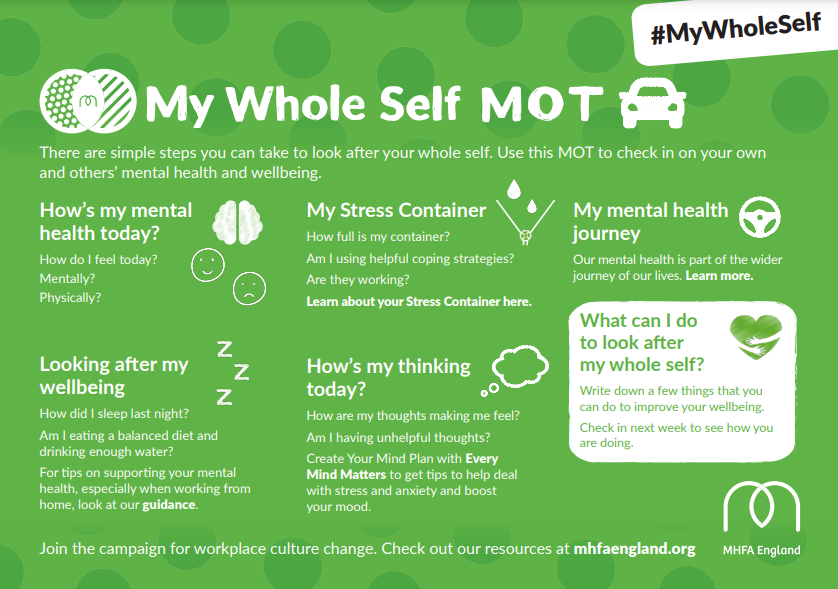
Work can be challenging and stressful at times, and so it is important to look after your mental health. This not only ensures that you are happy and healthy, but in addition, taking care of your own mental health needs means you will be able to do your role to the best of your ability.
This article details 7 tips to help you look after your mental health in the workplace.
Striking the balance between work and home life is very important for our wellbeing.
A great place to start for assessing your own mental health and identifying the areas that you’re struggling with, is with this My Whole Self MOT from MHFA England.

Source: https://mhfaengland.org/mhfa-centre/resources/
This helpful resource can also be used to check in with others too.
There are many different places of work, from offices, warehouses, and shops to the great outdoors, and even our homes! But no matter where you work, the tips listed below can be applied to help you take care of your mental health in the workplace.
Ensure that you take regular short breaks throughout your working day, even if it’s just for 30 seconds. This is especially important if you’re sitting at a desk all day. Perhaps set an alarm every hour or so to stand up, stretch and take a moment away from the screen. If you’re working on your feet all day, take the opportunity to rest your legs for a short moment if possible.
Take your lunch breaks away from your workstation. On your breaks, go to the canteen if there is one available, or to the staff room. If it’s a nice day, you could sit outside. Do an activity you enjoy on your lunch break, whether that’s reading a book, listening to a podcast, going for a short walk or simply enjoying the time to eat mindfully.
While we’re on the topic of lunch! Make sure to drink plenty of water to keep hydrated throughout the day. Dehydration can cause fatigue and tiredness, which can reduce your concentration and focus. It’s also important to eat a balanced diet in order to get your daily intake of vitamins and nutrients, which can help boost your mood.
Mind Charity have produced this factsheet that details the link between food and our mood.
Working in a tidy workspace can reduce stress by helping you feel calmer and can also make you more productive. If you have the option, add some plants, small photos, or personalised stationery to your workstation. Having a bright workspace with a personal touch can provide a boost to your mental health.
Creating a to-do list for each day or each week, and prioritising tasks can help to reduce stress. Mark any important deadlines in your calendar so that you don’t forget them. Reducing stress prevents burn out and is vital for looking after your mental health. Read more about how stress affects our mental health.
Not on the job of course!
Sleep is often sacrificed for other activities, but getting enough sleep every night is very important. You should aim for between 7-9 hours of sleep every night. Read more on the positive impact of sleep on our mental and physical health.
One of the best ways to take care of your mental health is to talk. Chat with colleagues, family and friends, and be open and honest about how you’re feeling. If you feel like you need help, ask for it. Speak with your manager and highlight how you’re feeling. If there’s anything you feel could be implemented to help you, raise this too. Employers should make any reasonable adjustments that would help you to perform your role to the best of your ability.
A lot of companies offer mental health support too, whether through external resources or internal services.
Over the last year, working from home has become a big part of many of our lives. Whilst working from home can provide greater flexibility for workers, it can also be harder to draw the boundary between work and home life. All of the tips above can help you to look after your mental health when working from home, but some tips specific to remote working include:
Check out the video below from MHFA England for some great tips on supporting your mental health when working remotely:
If you’re looking for a fulfilling role in the Health and Social Care industry, we have a variety of roles available, both clinical and non-clinical, which you can find more information on here.
Find out more about our workplace culture.
Photo by Daria Pimkina on Unsplash